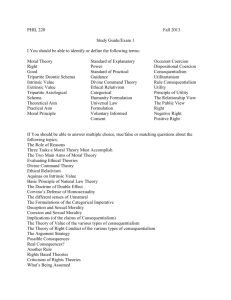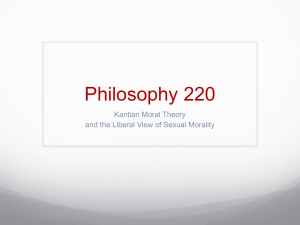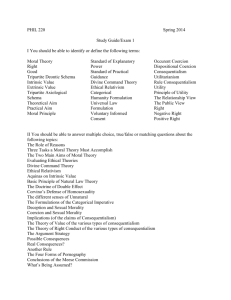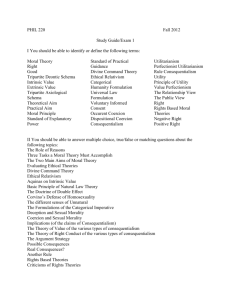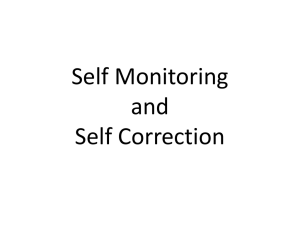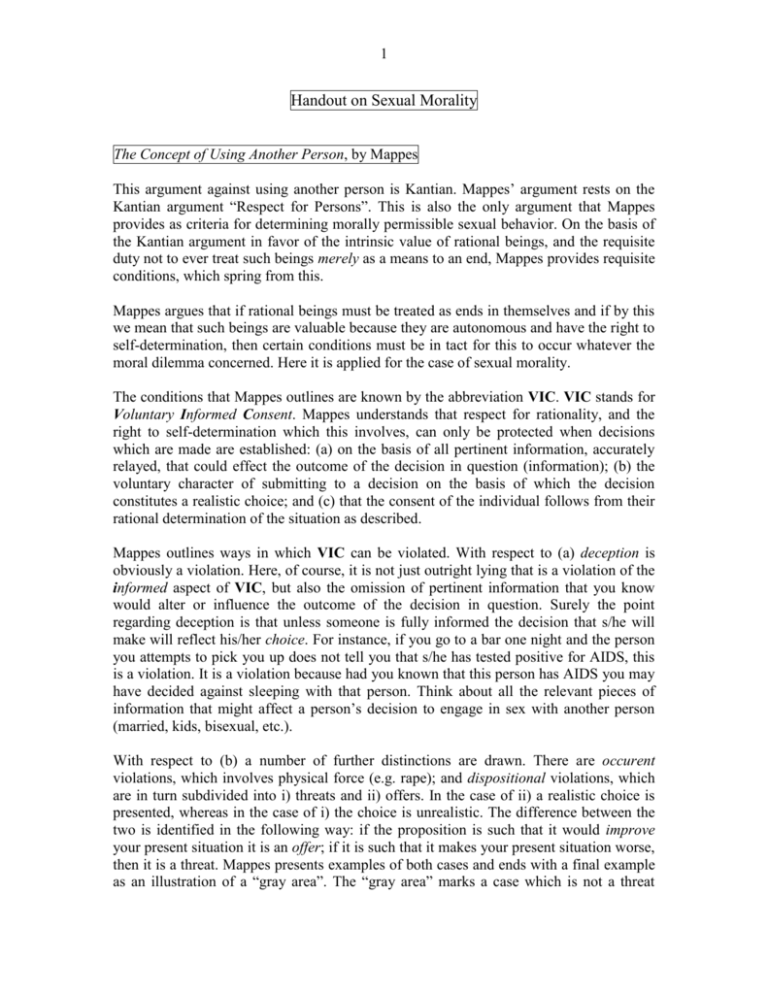
1
Handout on Sexual Morality
The Concept of Using Another Person, by Mappes
This argument against using another person is Kantian. Mappes’ argument rests on the
Kantian argument “Respect for Persons”. This is also the only argument that Mappes
provides as criteria for determining morally permissible sexual behavior. On the basis of
the Kantian argument in favor of the intrinsic value of rational beings, and the requisite
duty not to ever treat such beings merely as a means to an end, Mappes provides requisite
conditions, which spring from this.
Mappes argues that if rational beings must be treated as ends in themselves and if by this
we mean that such beings are valuable because they are autonomous and have the right to
self-determination, then certain conditions must be in tact for this to occur whatever the
moral dilemma concerned. Here it is applied for the case of sexual morality.
The conditions that Mappes outlines are known by the abbreviation VIC. VIC stands for
Voluntary Informed Consent. Mappes understands that respect for rationality, and the
right to self-determination which this involves, can only be protected when decisions
which are made are established: (a) on the basis of all pertinent information, accurately
relayed, that could effect the outcome of the decision in question (information); (b) the
voluntary character of submitting to a decision on the basis of which the decision
constitutes a realistic choice; and (c) that the consent of the individual follows from their
rational determination of the situation as described.
Mappes outlines ways in which VIC can be violated. With respect to (a) deception is
obviously a violation. Here, of course, it is not just outright lying that is a violation of the
informed aspect of VIC, but also the omission of pertinent information that you know
would alter or influence the outcome of the decision in question. Surely the point
regarding deception is that unless someone is fully informed the decision that s/he will
make will reflect his/her choice. For instance, if you go to a bar one night and the person
you attempts to pick you up does not tell you that s/he has tested positive for AIDS, this
is a violation. It is a violation because had you known that this person has AIDS you may
have decided against sleeping with that person. Think about all the relevant pieces of
information that might affect a person’s decision to engage in sex with another person
(married, kids, bisexual, etc.).
With respect to (b) a number of further distinctions are drawn. There are occurent
violations, which involves physical force (e.g. rape); and dispositional violations, which
are in turn subdivided into i) threats and ii) offers. In the case of ii) a realistic choice is
presented, whereas in the case of i) the choice is unrealistic. The difference between the
two is identified in the following way: if the proposition is such that it would improve
your present situation it is an offer; if it is such that it makes your present situation worse,
then it is a threat. Mappes presents examples of both cases and ends with a final example
as an illustration of a “gray area”. The “gray area” marks a case which is not a threat
2
because it improves the persons present situation, but it is not quite an offer because it
seems to resemble the exploitation of a desperate situation where the person in question
does not really have a realistic choice, hence it may not be voluntary. Surely the point
regarding voluntariness is whether a decision actually reflects you. Your decision is
suppose to be an instantiation of your right to self-determination. That is, that your
actions somehow represent you, who you are, what kind of life is a life that you see fit for
pursuing, living. So a decision must be arrived at without outside forces determining
what you might decide. For instance, if you are told that you can get an “F” in a course
that you are acing if you refuse to have sex with your teacher, this is a violation because
the choice that you make will be one that you would not have “freely” chosen if your
teacher did not have this “power” over your life. However, if your teacher offered you an
“A” in a course that you were failing if you had sex with him her, this would not be a
violation. You have a choice and that outcome of the choice either way would be a
reflection of you. If you say “No” then you will get the grade that you yourself have
earned, and if you say “Yes” well you are just the kind of person that sees nothing wrong
about sacrificing your physical dignity for self-interest.
Morality and Human Sexuality, by Punzo
Though Punzo is not responding to Mappes directly, we could say that Punzo’s position
on sexual morality would accept VIC, but would argue that by itself VIC is insufficient to
provide moral guidance in order resolve moral dilemmas concerning acts of sex.
Let’s recall Mappes’ point. He says that “any thing goes” (any sexual act with
whomsoever) so long as the sexual encounter is the outcome of rational choice for all
parties concerned. This means that the actual act itself and the actual sexual proposition
are not considered. The only thing that Mappes did consider is whether the sexual
proposition was presented in such a way that its recipient could make a rational choice as
the instantiation of his/her right to self-determination. So, adultery, group sex, sadism,
masochism, etc. all perfectly acceptable so long as all parties concerned have agreed in
advance to what is to take place voluntarily. So this is why I say that for Mappes
“anything goes”.
Punzo believes that one’s right to self-determination is important; indeed the decision to
partake in an act of sex should not be taken at all lightly. What Punzo does say is that
indeed any sexual act short of commitment is immoral and compromises the human
dignity of the other person and oneself. But how does he argue for this position?
Punzo would argue that Mappes’ position fails because it fails to tell us anything about
sexual morality. Indeed VIC could and should be a prerequisite for any interhuman
activity. For instance, shouldn’t a student be fully informed as to the criteria that a
teacher consults in his/her assignment of grades (some teachers don’t include attendance,
others participation and so on), and shouldn’t a student, once informed, be given the
choice to accept or reject these criteria (by dropping the course, for instance)? But surely
3
we do not want to say that this kind of agreement is the same in kind with the
“agreement” to engage in sex with someone. It is not the same to violate someone’s right
to self-determination in case of false advertising and to violate someone sexually. Notice
that if VIC is all that must be considered in the case of sexual morality then to violate
someone sexually can only be a violation of one of VIC’s components. This just means
that when someone is violated sexually we really just mean his/her right to decide to have
sex with you was not respected. Let’s take the rape as an example. This is a violation
according to Mappes just because it is a case of occurent involuntariness. That is, rape is
wrong only because it does not reflect the voluntary choice of the victim. Indeed, the
same exact claim would make theft wrong. When someone violently takes money from
someone else by force, this too is wrong just because the victim did not agree to give the
aggressor his/her money. Can you honestly say that rape and theft are wrong for the same
reason? Notice that if these two acts (rape and theft) are both wrong for the same reason
then they commit the same exact moral violation, in which case the crimes should be
punished in precisely the same way. “Punishment is expected to fit the crime”. Where
two different acts are criminal or wrong for the same reason, then their punishment
should be the same. I submit to you that rape is wrong not just because it is obviously an
involuntary act. In fact, the testimony of rape victims reveals that the violation in
question does not concern (or only) their right to decide to have sex with someone, but it
is a violation of “self”. This helps underscore what is missing in Mappes’ position. Sex is
just an entirely separate kind of interhuman activity that is not comparable to any other
inhuman activity. Most people would, in fact, say that when comparing theft and rape
their obvious difference is that in the first the act is impersonal whereas in the second it is
personal. We do not just mean that the latter act is more painful (quantitatively different);
we also mean that the latter act is just a different kind of violation (qualitatively different)
than the first. The word “personal” is important and useful here. It is a derivative from the
word “person”. Indeed, Punzo would argue that sex is a qualitatively different kind of act
because it involves persons, not things, or roles. More on this shortly.
Punzo says surely the moral “commitment” involved when making a promise to play
tennis with a friend (violation is when I stand him/her up), or buying meat from a
supermarket (violation is when the meat days “Made in Greece” when really it is from
Belgium) are different from engaging in sex with someone (for pleasure only). Indeed,
when we do not live up to moral commitment in the first two cases it is because the
person stood up and the person buying Belgium meat are not given the chance to make
their own choice. In the latter case, when someone is violated it is because s/he is not
respected as a “person”.
Punzo (appealing to an existentialist point of view) argues that the act of sex is different
from any other interhuman activity because it involves us as “historical and existential
beings”. Man is unlike other species because he has free will. In other words, man is not
in “any way” programmed or determined to be in a particular way. Man is first born to
the world and then what or who s/he shall become will be invented by him as s/he makes
his way through the world. Man, as Heidegger says, ex-sists (from the Latin), which
means that man is a transcending being or is a being that stands out or moves beyond.
This is so because man is never fully understood by the choices or circumstances that
4
influences his choices. Circumstances are influential, but even if, for instance, I place my
hand on a burning stove, though biologically we can predict a serious burn to the hand,
whether the person in question will decide to keep his hand on the stove, pull it away,
press harder (and so on) no one can know because that person has not yet decided or
determined his/her (re) action. Man is transcendental because man is more than just a
biological (in this case) being whose decision is determined by. The point is that the
world and its contents are devoid of meaning prior to man’s preoccupation with it. As the
world receives meaning from each individual person, so that person decides on the
significance of his circumstances and thereby responds to them (as s/he sees them). Man
is, therefore, at any given time a historical and existential being because he is the
semblance of all his past choices (historical part) and future choices (existential part).
Now what does all this have to do with sex? Two points need to be highlighted at this
point. Before embarking on the existential analysis relevant to Punzo’s position, it was
said that sex is unlike any other inhuman activity in that it is personal and thereby
involves persons, not mere things. That which remained to be seen was “what do we
mean by a person?” The existentialist viewpoint argues that what makes us persons rather
then mere inert things is that we have free will, indeed, we are historical and existential
beings. So a violation of a person would be tantamount to a violation of someone’s free
will or would be when you somehow behave toward that being as if he and his
meaningfulness were determined by you or the surrounding circumstances. The second
point that needs to be made is that the existentialist does not believe that man can be
anything in isolation. That is man is not an island. Man’s ex-sistence presupposes a world
and other existential beings. Why? This is so, because man only comes to acknowledge
himself as a separate and indeed ex-sistential being in counter-distinction or against the
background of others, if you will. The “act” of becoming is the act of choosing how to
relate to one’s world and others.
Interhuman or interexistential relations are of special significance because our relations
with nonexistential entities (dogs, cats, and rivers) are not reciprocated in which case I do
not “see” myself through them. For instance, if when I come into class everyone laughs, I
may become self-conscious, that is, literally conscious of myself because I am made to
see myself as the class now sees me, namely as a spectacle. Now if I merely become that
spectacle through the class’ eyes, then I will probably “turn red” in embarrassment (or
something of the sort). If this happens then I have not actually transcended or stood out
from my circumstances, I have become them—a spectacle—because this is how I now
see myself. For this kind of relationship to be a good one (the existential term is
“authentic”) then this relation must be reciprocal (I must decide how to react to this
situation). Notice, that this dynamic relation can not materialize in the case of
nonexistential entities because such entities do not have the capacity to impose their will
or the way in which the world holds meaning to them on others.
Sex is the most precious of interexistential activities because such acts (can) engage the
individual wholly or completely. When you have sex with someone short of his/her”
existential commitment” that someone is not seen as a person. Indeed that someone
permits him/herself to be come the mere object of your engrossment. Even when this is
5
done jointly with mutual consent (Mappes), each sees the other and him/herself as a mere
object. But objects are the kinds of things whose value is wholly determined by their use,
in which case one is no longer a “self”, indeed myself, but a thing (both in my eyes and in
the eyes of the other). So I use myself as a means to mere physical satisfaction and I see
the other in the same way. Notice that were the other a “person” to me, s/he would not be
substitutable, whereas when the other is a mere object to me anyone at the right place at
the right time and with basic aesthetic appeal would do. Hence both parties violate each
other and him/herself.
As transcendental beings we are future oriented beings. In other words, our acts/choices
have importance because they are the kinds of things that we would like to see repeated
again and again. I transcend, when I and my history (at the moment of the act’s
instantiation) move beyond the mere “here and now” that makes this act what it is. If
there is nothing in the act apart from the “here and now”, then it is a debase compromise
of self/person. When you have sex only for physical pleasure, it would indeed belong
only to the present, to the “here and now”. To rectify this, we must engage in sexual acts
only when the other is received as a historical and existential being. This would mean that
the act itself transcends the “here and now” just because the act is defined by a mutual
relation between two whole, existential persons. This would presuppose knowing the
other person (knowing that someone as a person) well in advance before embarking on a
sexual relation. This is why Punzo argues that sex short of commitment is immoral.


